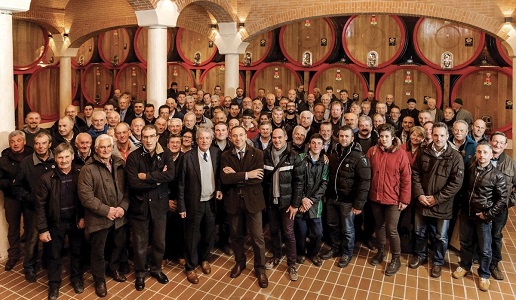The importance of wine cooperatives

Italian wine cooperatives, which represent an important share of wine production, are improving in quality and represent a social and environmental line of defense that should not be underestimated.
Every once in a while I remember how more that 60% of the wine produced in Italy and close to over 40% of turnover is from Italian wine cooperatives. I am not saying that all the wine is quality, but this is even true of other producers. Nevertheless, this is the reality of the situation and the evolution of many Italian cooperatives is there for everyone to see.
We are not just talking about what has happened in Alto Adige over the past 30 years, where many Kellereigenossenschaft are producing top-quality wines. Nor the noble examples in Piedmont, like Produttori di Barbaresco, not to mention Vite Colte and Vinchio Vaglio. In southern Italy, in Sicily, there is Mandrarossa, the top line of Settesoli, along with CVA Canicatti. In Sardinia there are quite a number of examples, the same goes for Abruzzo, first among them Codice Vino and Tollo. Then there is Vinea Domini Gotto d’Oro and Cantina del Cesanese in Lazio; Moncaro and Colli Ripani in the Marche; Vecchia Cantina in Montepulciano in Tuscany; Produttori di Cormons in Friuli; Cantina di Negrar in Valpolicella; Cavit and Mezzocorona in Trentino; and Cantina di Riomaggiore in Liguria. There are even some quality cooperatives in Puglia, iUmbria, Emilia and Romagna. In other words, throughout Italy.
This does not mean that there are other cooperatives that are not up to par, wineries that pay their suppliers poorly and badly, those that create problems for the image and prices of various appellations. However, there are fewer now than there were a few years ago, with greater attention paid to quality and sustainability, which only a few years ago would have been unthinkable.
I am fully aware that some may not agree with me, but I would humbly suggest that they be more open-minded. Among the other positive aspects of cooperatives are some that are little-known, this because cooperatives often do little promotion and not always in an efficient way, at least when it comes to fine wines. One these is that if an organic or at least sustainable winemaking approach is adopted by a cooperative, it affects hundreds and sometimes thousands of winegrowers who apply generalized protocols involving vast productions. A second is that cooperatives allow tiny producers to continue to cultivate small vineyards, thus safeguarding not only winegrowing but also the landscape and the land. If this did not exist or was not as vast, then we would have some serious problems indeed.
All these factors are important for Italian winemaking, and I say this not to sanctify anyone in particular but only to offer some food for thought.

 Italiano
Italiano








